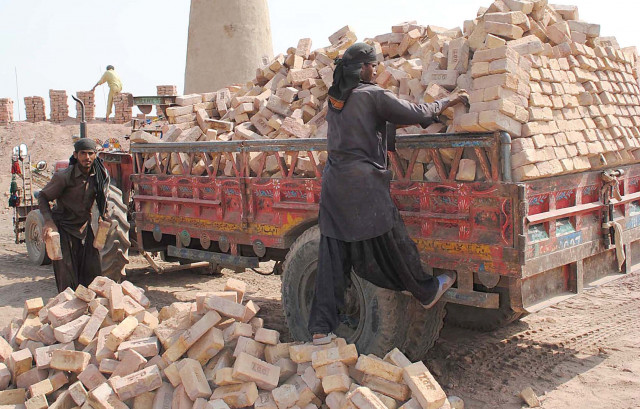For the cheapest of building materials, the return of a tax opens new window on debate
Tax collectors say they’ll use utility bills to estimate sales, but kilns mostly use coal.

Now that brick kilns are no longer exempt from paying a sales tax, anyone who wants to build a house with this cheapest of materials will have to fork out more. For example, if you are building a 120-square-yard plot double-storey bungalow for Rs2 million, buying bricks will take up 5% of the cost. Before the tax exemption that would cost you at the most Rs100,000. If the 17% sales tax is added, it will cost you an estimated Rs117,000.
Small wonder then that kiln owners are worried that paying a tax may force them to cut back on production. For its part, the Centre expects to rake in an additional earning of Rs106 billion by re-imposing a tax on several items, including cement, concrete blocks and bricks. Kilns with less than Rs5 million sales annually will remain exempt.
“Bricks are the cheapest material when it comes to the quantity used in construction work. But once the GST is imposed, the prices will obviously go up,” said Farooq Chaudhry of the Sindh Brick Kiln Owners Association. He told The Express Tribune that 12x6 inch bricks cost between Rs6,500 and Rs7,000 for every 1,000 pieces while the cheapest and smallest bricks are sold for Rs3,100 to Rs3,300 per 1,000, excluding transport charges.
Tax evasion
It is not as if these businessmen don’t agree that ideally, every sector should pay taxes. Haji Yaqoob of the Hyderabad Chamber of Commerce and Industry taxation committee feels for example that this should happen. However, he points out that with inflation, the tax would affect the kilns as well as the construction industry.
“Tax evasion is rampant in Pakistan and the competence of tax collectors is just as questionable,” he observed. Yaqoob is of the view that monitoring the production and sales of bricks every-day will be difficult for tax collectors. “Keeping in mind the informal system of manufacturing and sales, tax evasion or even corruption can’t be ruled out.”
He demanded that the tax department come up with an effective mechanism if the tax is to be imposed.
For their part, the tax officials say they have a few collection methods in mind. “We can check their stocks at a given time and assess their value. The capacity of their machinery and the size of a kiln can also provide an estimate of production. Utility bills can also help estimate sales,” suggested Imtiaz Shaikh, who is the Tax of Inland Revenue Service’s additional controller.
Tax collection
However, Shaikh had no specific method of collecting the taxes. He proposed deputing staff at the kilns to monitor the sales, but considering the fact that there are around 1,500 in Sindh alone, it seems impossible. As Farooq Chaudhry of the kiln association pointed out, utility bills won’t be much of an indication considering that kilns use coal for energy.
Those opposed to the tax fear that kiln owners may forge records to showing an annual sale of less than Rs5 million to evade the tax, also there will be hardly any mechanism to ensure that the bricks sold were not inclusive of GST.
“So far no specific plan has been devised to collect the tax,” said an Inland Revenue Service official.
The tax will also affect builders and developers, as they will end up paying between two-and-a-half to three per cent more for construction supplies. “The component for bricks is around three per cent while that for cement varies between 12 and 15 per cent of the total material for construction,” explained project manager for Abdullah Builders and Developers, Afzal Khan.
The rate of construction, currently Rs1,200, will grow to around Rs1,400, he added. “This simply translates into additional expenses of Rs250,000 to Rs300,000 on a Rs10 million project.” There are an estimated 1,500 brick kilns in Sindh, with each employing around 100 to 125 labourers. The kiln owners have planned to lobby the government to retain the exemption. Sindh Brick Kiln Owners Association president Haji Behram Khan told The Express Tribune that owners from all over the country will meet in Islamabad on June 13. Parliamentarians are also expected to attend. They will ask them to drop the plan to re-impose the sales tax.
Published in The Express Tribune, June 13th, 2011.



















COMMENTS
Comments are moderated and generally will be posted if they are on-topic and not abusive.
For more information, please see our Comments FAQ